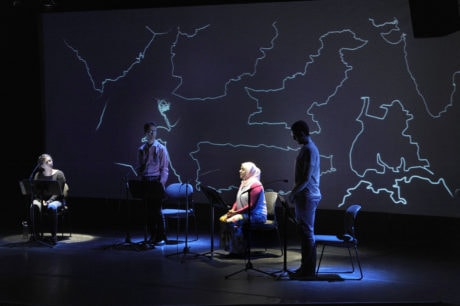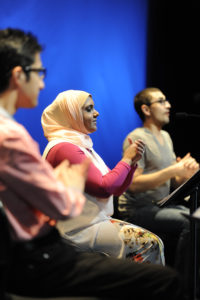A non-traditional, very timely theater experience is arriving at Reston’s CenterStage from the creative risk-taking minds of award-winning Ping Chong + Company. What the Ping Chong + Company will be performing may well resonate now more than ever with its particular theme and issues raised during the current election cycle. The performance is Beyond Sacred: Voices of Muslim Identity.

If you don’t know Ping Chong, the founder of Ping Chong + Company a short bio cut will serve as introduction. He is a recipient of a Guggenheim Fellowship, a USA Artist Fellowship, two BESSIE awards, and two OBIE awards. His work has been supported by the Jim Henson Foundation, among others. He has received a National Medal of Arts from President Barack Obama.
Beyond Sacred: Voices of Muslim Identity is part of the 2016-17 professional touring artists series at the Reston Community Center’s CenterStage.
This In the Moment column is based upon an interview with Ping Chong, founder of Ping Chong + Company, and Sara Satz, Associate Director, Ping Chong + Company.
David Siegel: What was your impetus to start the Undesirable Elements series in 1992?
Ping Chong: Undesirable Elements first originated as a visual arts installation at Artists Space in New York City in 1992. When I created the installation, I was interested in intolerance and xenophobia and that was why I titled it A Facility for the Channeling and Containment of Undesirable Elements. What exactly was “undesirable” was left to the viewer to determine for themselves. It was not a term I used commonly, but the roots of it go back to my awareness of being “other” in America.
The first performance was very under the radar — a tiny performance in the gallery itself. It was an experiment. The first production looked at the phenomenon of cultural difference and similarity. It was about what separates us but also about what unites us as human beings. Now, Undesirable Elements is a highly structured oral history documentary theater work. It’s like a sonnet — it has a set form and the variations come from within the form. The form is the same in each production, but the results and impact are always vastly different because of the nature of the stories told and people telling them. Undesirable Elements has always been about otherness and belonging, but since its inception, it has evolved beyond cultural or ethnic identity to explore other aspects of inclusion or exclusion.
Recent projects have explored themes such as the disability experience, experiences of survivors of sexual violence, and peace and reconciliation work with a refugee community. The Undesirable Elements project has taken me and my collaborators to places we never expected, and it continues to move and inspire me.
How did you choose these particular people to represent Voices of Muslim Identity?
Sara Zatz: Each new Undesirable Elements project features real people telling their real stories on stage. We start by working with our partner organization(s) and other community groups to put out calls for participation in the project. We visit community centers and gatherings to tell people about the opportunity and about our work. Then, people who are interested submit what we call a Participant Questionnaire. It’s a way for us to begin to get to know the potential storytellers. We begin our first round of interviews with potential participants—about 2 hours with each person—and from there, we invite the people who will become the cast of the piece. We engage the final cast in further interviews to develop the script. Beyond Sacred, like all of our UE work, is about creating increased understanding of human diversity and commonality—so it’s important that we select a group that bring a wide range of experiences, backgrounds, and stories to share.

In the end, we found that we got far more responses from younger individuals, and made the decision to make that intentional and cast a show of entirely (at the time) people under 30, who had come of age after 9/11. They were all children or teenagers when 9/11 happened, and it deeply impacted their experiences of growing up Muslim in the United States. It had always been our intention to seek participants who represented a wide-range of Muslim experiences, people who had been born and raised Muslim, people who had converted, people who considered themselves observant and practicing, as well as those who identified more as “culturally” Muslim. Although the show is subtitled “voices of Muslim identity” I think it is just as much about challenges faced by young people of color across the United States including policing, economic disadvantage, challenging norms of gender and sexuality.
Why is it important for a diverse audience to see Beyond Sacred?
Ping Chong: This project, like all of our interview-based work at Ping Chong + Company, is intended to make space for people’s voices who are rarely heard in our civic dialogues on local and national levels. “Beyond Sacred” intends to build bridges of understanding between people who might imagine themselves to be very different from one another, but who, in the experience of this production, realize how much we all fundamentally share.
What is the impact of the performance on patrons?
Sara Zatz: Audiences have been overwhelmingly positive, and deeply grateful to have the opportunities to hear first-hand stories. This is true for both Muslim audience members who feel they are seeing themselves represented, but also non-Muslim audience members who are finding paths of connection to the experiences shared. Here are two quotes from audience members-
An example of one reaction from a high school student: named Emily A:
There isn’t a lot of diversity in the school I go to and because of that, I get a lot of stereotypes in my day to day life. Beyond Sacred changed that. It gave me a new way of seeing the world and the people in it. This year, I organized and carried out a drive to collect clothes for the Syrian refugees. I remember getting into a fight with one of my classmates, who thought that the Syrians should ‘stand up’ instead of ‘dying as a burden to someone else’. I didn’t think he was right. I understood better than that and a big reason for this understanding is that Beyond Sacred opened my eyes.
I do think it is telling that we are getting so many requests and inquiries from communities around the country. People do want to have this conversation, and people do see theater and art as a way of entering into difficult dialogues, which I think is incredibly positive.
Beyond Sacred, Voices of Muslim Identity is being performed on Wednesday, November 2, 2016 at 8 p.m. at Reston Community Center’s CenterStage – in Hunters Woods – 2310 Colts Neck Road, in Reston, VA. For tickets call (703) 476-4500, or purchase them online.




